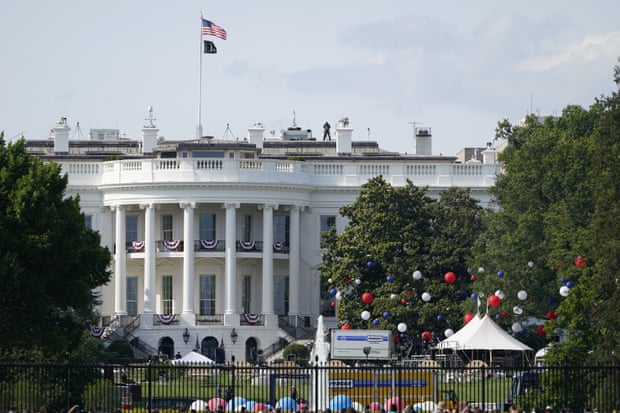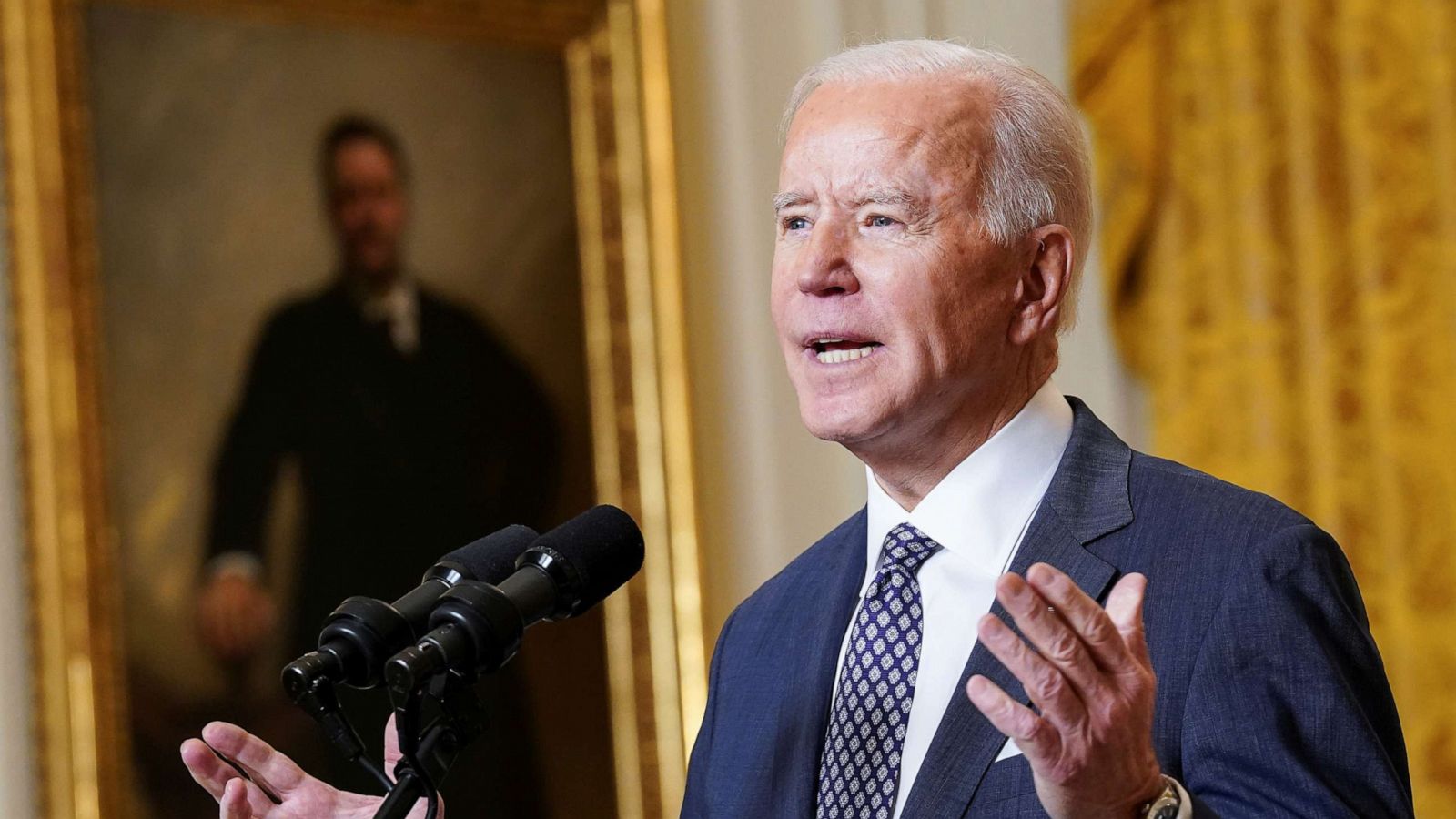M WAQAR..... "A man's ethical behavior should be based effectually on sympathy, education, and social ties; no religious basis is necessary.Man would indeed be in a poor way if he had to be restrained by fear of punishment and hope of reward after death." --Albert Einstein !!! NEWS,ARTICLES,EDITORIALS,MUSIC... Ze chi pe mayeen yum da agha pukhtunistan de.....(Liberal,Progressive,Secular World.)''Secularism is not against religion; it is the message of humanity.'' تل ده وی پثتونستآن
Sunday, July 4, 2021
Fourth of July: US celebrates but White House does not mandate masks or vaccines
Americans marked their nation’s 245th birthday on Sunday with fireworks, hotdogs, marching bands and a sense of great relief, after the coronavirus pandemic forced the cancellation of nearly all celebrations last year. As they did so, a senior administration official sought to explain why vaccinations and masks were not made mandatory for a major White House party, when he and other advisers to Joe Biden were stressing the need for Americans to lessen the chances of a surge in cases of the infectious Delta variant. Speaking to CNN’s State of the Union, coronavirus coordinator Jeff Zients said: “You’re protected if you’re vaccinated. You’re not protected if you’re not. We are not mandating vaccines. “At the White House tonight, there’s very rigorous testing and screening protocols. Those who are vaccinated do not need to wear a mask. Those who are unvaccinated do need to wear a mask.” A day after the 78-year-old president mingled with mostly maskless crowds at a cherry-picking festival in Michigan, around 1,000 people were invited to his Fourth of July celebration on the White House lawn. “We’re there to celebrate frontline workers and our military,” Zients said. “And these are people who understand the importance of safety and doing the right thing. I think most of these folks are vaccinated, and we encourage all Americans to get vaccinated as soon as possible.” Asked why vaccination was not mandated, Zients said: “At the end of the day, it’s an individual choice. We hope all individuals make the right choice here and get vaccinated as soon as possible.” Speaking to ABC’s This Week, Zients insisted: “The event at the White House is being done in the right way. It’s an outdoor event with testing and screening. Vaccinated people not wearing masks. Unvaccinated people masked. It’s being done in the right way, consistent with [Centers for Disease Control and Prevention] guidelines. “That said, we are doubling down on our efforts across the summer months, we will vaccinate millions more people because you need to get vaccinated to be protected against the Delta variant and against this disease overall.” The Biden administration missed its aim of having 70% of adult Americans with at least one shot by the holiday weekend. Elsewhere on Sunday, chief medical adviser Anthony Fauci warned of likely spikes of cases of the Delta variant in areas with low vaccination rates, often due to resistance among Republicans loyal to former president Donald Trump. In the first year of the pandemic, Trump staged a number of White House events with imperfect public health measures, followed by increases in Covid cases. Trump himself was hospitalised, reportedly with a more serious case than admitted. Biden was scheduled to address his own White House event, on the theme of “Independence Day and independence from Covid-19”. After dark in Washington, the National Mall was due to host a major fireworks show, a 17-minute cannonade from the Lincoln Memorial. On Capitol Hill, marching bands staged a traditional parade. New York was also set to host a major fireworks event, for which 50 pyrotechnicians spent days loading more than 65,000 shells on to five barges in the East River. In Ocean City, Maryland, fireworks were unintentionally detonated as they were being set up, leaving employees of the fireworks company with minor injuries, authorities said. Numerous videos posted to social media showed fireworks popping and crackling near a crowded beach. No beach or boardwalk patrons were injured, the fire department said. The city said fireworks shows in multiple locations were canceled. Some classic events with a national profile, such as Nathan’s Famous Hot Dog Eating Contest in Coney Island in Brooklyn, remained scaled back to allow for social distancing in recognition of a pandemic which has killed more than 605,000 in the US. In Florida, several cities canceled fireworks out of respect for the victims of the building collapse in Surfside, near Miami, last month. Trump went ahead with a rally near Sarasota on Saturday, despite reported suggestions from aides to Governor Ron DeSantis that he should not do so. It was expected to be the busiest Fourth of July for car travel on record, with an estimated 43.6 million Americans hitting the roads, 5% up on 2019, the American Automobile Association said. But for some, Fourth of July was still a somber occasion. In addition to the pall of the pandemic and the Florida building collapse, the western US faces a heightened risk of wildfires after a heatwave and amid extremely dry conditions. The Department of Homeland Security, meanwhile, warned state and local police this week of a heightened threat of violence by domestic extremist groups.
https://www.theguardian.com/us-news/2021/jul/04/fourth-of-july-us-celebrates-white-house-event
Post-ABC poll: Biden earns high marks for handling the pandemic, but many Republicans resist vaccination
By Dan Balz & Emily GuskinPresident Biden has earned high marks for his handling of the coronavirus pandemic, but the government’s effort to vaccinate as many Americans as possible continues to face hurdles, including resistance among people who identify as Republicans, according to a Washington Post-ABC News poll. Biden made addressing the pandemic his first priority as president. He and his team pushed to accelerate the distribution of vaccine doses, developed during the Trump administration, and pressed Congress to enact a $1.9 trillion stimulus package to help the economy rebound from covid-related shocks and disruptions.
Today, more than 6 in 10 Americans say they approve of the job the president has done in dealing with the pandemic, almost identical to findings in April as he neared the end of his first 100 days in office. His overall approval stands at 50 percent positive and 42 percent negative, figures that are also virtually the same as in April.
In both cases, there are huge differences in ratings offered by Republicans and Democrats, a fresh signal of the nation’s defining partisan breach. On his overall job rating, 94 percent of Democrats approve compared with 8 percent of Republicans. On the pandemic, Democrats are at 95 percent approving, Republicans at 33 percent.
One low mark for the president comes on the issue of immigration at the U.S.-Mexico border, where 33 percent of Americans say they approve of how he is handling the issue, amid a surge of migrants attempting to cross into the country. A slight majority (51 percent) say they disapprove, including 90 percent of Republicans. Sixteen percent overall say they have no opinion.
In keeping with those divisions, Biden’s job performance is viewed in starkly different terms among those who have been vaccinated and those who have not. About 2 in 3 of adults who have gotten at least one shot approve of how he is doing his job, compared with fewer than 1 in 3 of the unvaccinated. Eight in 10 vaccinated Americans rate him positively for his handling of the pandemic, compared with fewer than 4 in 10 of those not vaccinated.More than 600,000 people have died in the United States from covid-19, with nearly 34 million cases reported. In the Post-ABC poll, 3 in 4 Americans say they have not contracted covid-19. Another 11 percent report that they have tested positive, while 12 percent say they think they had covid-19 but never tested positive. A majority of Americans (69 percent) say they are at either low or no risk of contracting the disease, while 29 percent consider themselves at either moderate or high level of risk. Notably, unvaccinated people are less likely to say they are at risk of getting sick from the coronavirus than those who have received a vaccine, 22 percent vs. 32 percent.
Those perceptions of risk come at a time when the delta variant, a new strain that is considered highly transmissible, has been spreading in this country and at an even faster pace in other countries. U.S. officials have warned about the dangers of the delta strain, which has raised questions in some parts of the country about whether even vaccinated people should wear masks indoors.
Asked about the accuracy of these warnings about the delta variant, 45 percent say they believe U.S. officials are accurately describing the risk while 35 percent say the warnings are exaggerated. Nearly 1 in 5 express no opinion. Among unvaccinated Americans, 60 percent believe U.S. officials are exaggerating the delta variant’s risk, compared with 18 percent who say they are describing it accurately; 64 percent of vaccinated Americans say officials are accurately describing the strain.
Again, there is a sharp partisan divide, with 57 percent of Republicans saying officials are exaggerating the delta variant’s risk, compared with 39 percent of independents and 12 percent of Democrats. There is also an educational divide, with 59 percent of those with college degrees calling the warnings accurate, compared with 38 percent of those who do not have degrees.
Along with limited feelings of risk, there is a greater sense among Americans that their communities have moved significantly in the direction of recovering from the pandemic. Six in 10 Americans say their community has recovered, with 16 percent saying their communities are fully recovered and 44 percent saying they are mostly so. Of the 36 percent who paint a gloomier picture, 22 percent say their community has partly recovered while 14 percent say theirs have a long way to go.
Black adults are less likely to say their community has recovered (46 percent) than White adults (63 percent); 58 percent of Hispanic adults say their community has recovered.
The federal government’s initial handling of the pandemic drew widespread criticism, much of it leveled at President Donald Trump, who often disagreed with the health and science experts in his administration and sought to play down the severity of the crisis. Trump’s approval rating on the pandemic, after being initially positive, remained strongly negative throughout the remainder of his presidency.
Today, a majority of Americans (56 percent) say they are either very or somewhat confident that the nation has learned lessons from this pandemic that will make the response to another pandemic in the future more effective. Democrats are significantly more positive in their assessment than are Republicans or independents.
The Post-ABC poll was conducted June 27-30 among a random national sample of 907 adults, with a margin of sampling error for overall results of plus or minus 3.5 percentage points. Error margins are larger among subgroups.
https://www.washingtonpost.com/politics/post-abc-poll-biden/2021/07/03/54e95b6e-db43-11eb-8fb8-aea56b785b00_story.html



